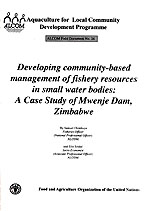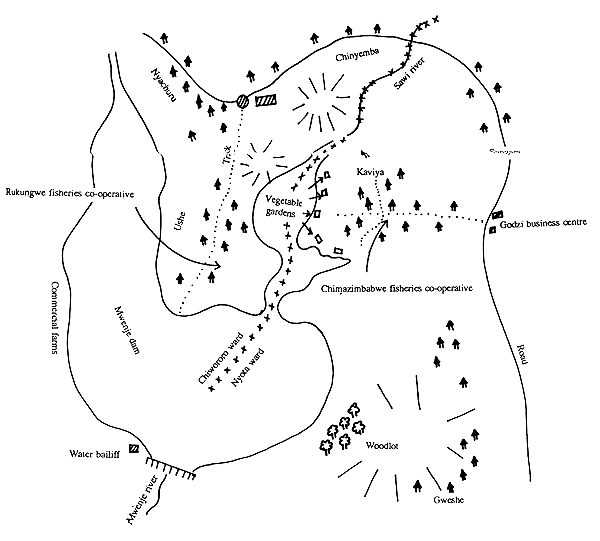
| ALCOM | GCP/INT/555/SWE |
| Aquaculture for Local Community Development Programme | GCP/RAF/277/BEL |
ALCOM Field Document No. 26
 | Developing community-based management of fishery resources in small water bodies: A Case Study of Mwenje Dam, Zimbabwe |
By Samuel Chimbuya
Fisheries Officer
(National Professional Officer)
ALCOM
and Elin Ersdal
Socio-Economist
(Associate Professional Officer)
ALCOM
Funding Agencies:
SWEDISH INTERNATIONAL DEVELOPMENT AUTHORITY
BELGIAN ADMINISTRATION FOR DEVELOPMENT CO-OPERATION
Executing Agency:
FOOD AND AGRICULTURE ORGANIZATION OF THE UNITED NATIONS
Harare, Zimbabwe, September 1994
This paper describes an ALCOM pilot project to introduce community-based fisheries management at Mwenje dam, Mazowe District, Mashonaland Central Province, Zimbabwe. It was carried out during 1991–93, and consisted of two activities:
assisting the community around Mwenje to set up a legal community-based institution to manage the dam.
carrying out test fishing to determine the state of fish stocks, fishing pressure on the dam and current yields.
An RRA (Rapid Rural Appraisal) around Mwenje dam conducted in 1991 led to the pilot project.
The paper reproduces the management plans for Mwenje dam formulated by the Mwenje Dam Committee.
The activities of the pilot project were carried out on behalf of ALCOM by Mr. S. Chimbuya, Fisheries Officer (National Project Officer), Mrs L. Westerlund, Economist (APO) and Mrs. E. Ersdal, Socio-economist (APO). Discussions were held during the course of the project with officials of the Mazowe District Council, Ward Councillors and communities of the four villages around the dam -- Mufuka, Munyengeterwa, Nyachuru and Chemadzibabwe.
ALCOM is a regional aquaculture and fisheries programme of the FAO (Food and Agriculture Organization of the United Nations). Based in Harare, Zimbabwe, it covers all the member-countries of SADC (Southern African Development Community) -- Angola, Botswana, Lesotho, Malawi, Mozambique, Namibia, Swaziland, Tanzania, Zambia, Zimbabwe.
The aim of ALCOM is to assist member-countries improve the living standards of rural populations through the practice of aquaculture. Toward this end, pilot activities are conducted in member-countries to demonstrate new techniques, technologies or methodologies. Successes achieved, ideas derived, lessons learnt, are applied on a wider scale by member--governments.
ALCOM is funded by Sweden and Belgium. Its preparatory phase began in 1986, and its first implementation phase in 1990.
ALCOM Address:
| Mail: | P O Box 3730, Harare, Zimbabwe |
| Telex: | 260 40 FAO ZW |
| Tel.: | 263-4-724985/263-4-734797 |
| Fax: | 263-4-736847 |
| E-mail: | [email protected] |
Hyperlinks to non-FAO Internet sites do not imply any official endorsement of or responsibility for the opinions, ideas, data or products presented at these locations, or guarantee the validity of the information provided. The sole purpose of links to non-FAO sites is to indicate further information available on related topics.
This electronic document has been scanned using optical character recognition (OCR) software. FAO declines all responsibility for any discrepancies that may exist between the present document and its original printed version.
3. CRITERIA FOR RESERVOIR SELECTION
3.1 Chichewo Dam
3.2 Taru Dam
3.3 Mwenje Dam
3.4 Mufurudzi Dam
4. RAPID RURAL APPRAISAL AT MWENJE DAM
4.1 Community interest and needs assessment
4.2 Findings and recommendations
5. TEST FISHING
5.1 The Drottningholm method
5.2 Test fishing using traditional fishing gear
6. ESTABLISHING COMMUNITY-BASED MANAGEMENT
6.1 Existing structures and organisations
6.2 New management structure:the Dam Committee
6.3 Appropriate Authority
6.4 Fisheries management in small water bodies
6.4.1 Fisheries potential of Mwenje Dam
6.4.2 Objectives for fisheries management
6.4.3 Access to reservoir fisheries
6.4.4 Permissible fishing gear
6.4.5 Number and distribution of gillnets
6.4.6 Fishing by-laws and law enforcement
6.4.7 Setting up management plans
7. PROBLEMS ENCOUNTERED AND LESSONS LEARNT
7.1 Initial gathering of data
7.2 Motivation and representativeness
7.3 Using indigenous knowledge
7.4 Creating partnership with rural people
7.5 Liaison with appropriate government departments
7.6 Sharing information and technology
9. APPLICABILITY OF COMMUNITY-BASED MANAGEMENT TO OTHER SMALL WATER BODIES IN ZIMBABWE.
1. Fish composition in gillnet catches at in 0–3m depth in Mwenje Dam
2. Matrix showing the delegation of responsibility for fisheries management at the national level
3. Measured and known parameters of Mwenje dam
4. Predicted fish yield at Mwenje using the morpho-edaphic index in four different models
5. The fishing gear and the fish species caught in Mwenje dam
6. Distribution of gillnet licences and % shoreline for each VIDCO
7. The schedule of licence fees and fines
Map of Mwenje Dam and surrounding areas
1. Traditional fishing gear used in Mwenje Dam
2. Existing structures that are responsible for natural resources management in communal areas of Zimbabwe
3. Existing structures responsible for fishery resources management in communal areas of Zimbabwe
4. New structure responsible for fishery resources management set up for Mwenje Dam under Chiweshe District Council
5. A new concept of community - based fishery resource management for communal areas of Zimbabwe (based on the Mwenje Dam experience)
1. Proposed Constitution for the Mwenje Dam Committee
2. Management plans for Mwenje dam
3. The Drottningholm test fishing method
| AGRITEX ALCOM CBM DNPWM FC NRC RRA SWB VIDCO | : Agricultural, Technical and Extension Services : Aquaculture for Local Community Development Programme : Community-based management : Department of National Parks and Wild Life Management : Fisheries Committee (Dam Committee) : Natural Resources Committee : Rapid Rural Appraisal : Small Water Bodies : Village Development Committee |
ABSTRACTCommunity-based management of fisheries resources at Mwenje dam (in Mazowe district, 80km north of Harare in Zimbabwe), was initiated as part of ALCOM's action programme on the utilization of small water bodies. The overall objective was to develop techniques for fisheries management and fish production in small water bodies that will benefit local communities through more food and higher incomes. The January 1993 Technical Consultation on the Enhancement of Small Water Body Fisheries in Southern Africa, organized by ALCOM, revealed that introducing techniques for fisheries management and fish production depended on controlling access to reservoirs and controlling the fishing methods in the fishery. Establishment of community-based institutions that can effectively control both access and fishing methods was seen as the first step. This document describes the process of assessment of community interest and commitment as well as the establishment of community-based institutions, such as a dam committee, that can manage fisheries resources in Mwenje dam. Assistance was given to the community to implement management. The state of the fishery was assessed through test fishing using traditional gears as well as the Drottningholm method. Committee members were trained in the biology of fish in their reservoir and the impact of fishing gear on the fishery performance. The work proved more time - consuming on ALCOM's part than expected, mainly because creating awareness and getting the Dam Committee established took time, and it took two years for the District Council to get appropriate authority for the dam. The Dam Community introduced a licensing system to control access to the reservoir in order to reduce fish poaching and to control the type of fishing gear used in the dam. Fish wardens paid by the community enforced the licensing system. Problems have cropped up in law enforcement, but the committee is confident that these can be solved. It is too early to make a statement about the success or failure of community-based management of fishery resources in small water bodies. The objective of increasing fish production is elusive in the short term. However, control of fishing effort and access to the reservoir fishery can, in the long term, ensure better fisheries performance. Other methods to increase production beyond the natural yield can be introduced when the ownership and management authority is well defined. |
Map of Mwenje dam and surrounding area

Sources: Maps from secondary data review
Key informant interviews with “kraal” heads
Semi-structured interviews with local people